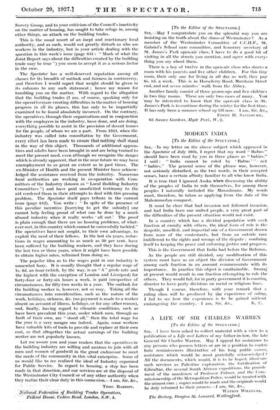MODERN INDIA [To the Editor of the SPECTATOR.] Sta,---In my
letter on the above subject which appeared in the Spectator of July 16th, I regret that *my Word " Babus " should have been read 'by you in three places as " babies." I said : " India cannot be ruled by Balms ' "—Ina " babies." The general- sense of the phrase was, however, not seriously disturbed, as the two words, in their' accepted senses, have a certain affinity familiar to all who -know India.
It is true that I ignored Asoka when discussing the ability of the peoples of India to rule themselv'es, for among these peoples I naturally included the Mussulmans. My words must, therefore, be taken as applying from the date of the Mahommedan conquest.
It must be clear that had invasion not followed invasion, and hid India been one united people, a very great part Of the diffictilties* of the present situation would not exist.
In a country which has a divided populatien with each *fraction at enmity with others, the ideal form of rule is the despotic, unselfish, and impartial one of a Government drawn from none of the contestants, but from an outside race indifferent to the rights and wrongs of the dispute ; confining itself to keeping the peace and enforcing justice and progress.
This is the Government that India had before the Reforms.
As the people arc still divided, any modification of this system must have as an object the division of Government among each fraction in- an amount commensurate with its importance. In practice this object is unattainable. Swaraj at present would result in one fraction attempting to rule the others. They would fail, for in party government it is courting disaster to have party divisions on racial or religious lines.
Though I concur, therefore, with your remark that a ruling class will be produced by the experience of ruling, I fail to see how the experience is to be gained without endangering the country.---I am, Sir, &c., K. C.


























































 Previous page
Previous page